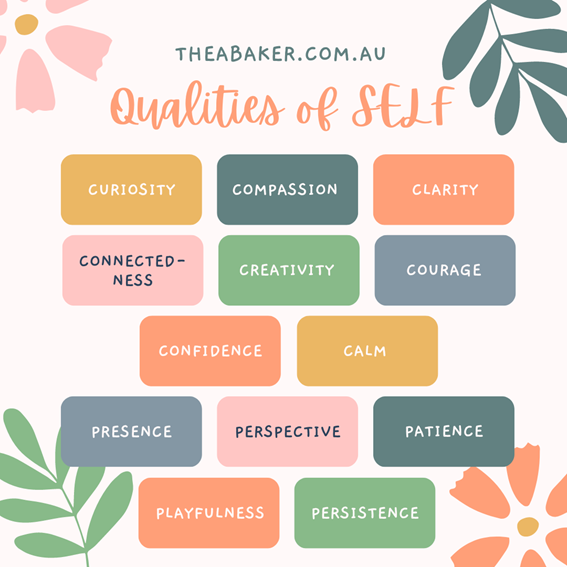Getting friendly with your parts
Getting friendly with your parts
I’m less fired up than I was last week so I’m returning to the theme of parts work using the lens of Internal Family Systems (IFS). Two weeks ago, I shared a bit of an overview of IFS (click HERE if you didn’t see that) and how it can be a useful approach to better understand our emotional responses, behaviours, pervasive beliefs, and triggers. This week I’m going to dig a little deeper within this framework and also provide some really useful tools, strategies and podcasts that you can refer to and learn more from.
Before I provide some practical approaches to better understand our parts I wanted to revisit the concept of our ‘SELF’ or our embodied, adult part. One of the quickest and easiest ways to know if we’re in reacting, responding, and behaving from a ‘SELF’ perspective is to notice whether we are displaying what Richard Schwartz identifies as the “Eight C’s” and “Five P’s” of ‘SELF’. The “Eight C’s” are: curiosity, compassion, clarity, connectedness, creativity, courage, confidence, and calm, whilst the “Five P’s” include: presence, perspective, patience, playfulness, and persistence.
When we are unblended from our parts (exiles, managers, firefighters) we feel calmer and this is usually accompanied by a greater feeling of space. We are also able to approach those parts with more curiosity and patience and this often comes with a greater confidence in our capacity to explore our parts. This in turn allows us to relate to our parts in novel more connected ways. As we continue to show up with a felt presence of ‘SELF’ we receive more clarity behind our part’s behaviours. Compassion for our parts flows from this position of insight and can also allow greater creativity to support parts with whatever they need to unburden, heal, and develop new roles within our internal system – a courageous act. This process requires ‘SELF’ to develop persistence and perspective as our parts often have lots to say! Lastly, once parts are healed ‘SELF’ can show greater playfulness in maintaining relationships with parts.

When it comes to exploring your other parts, there are a range of different ways to approach this – when we’re in session this can be an organic process, or we can deliberately choose to spend an entire session exploring a specific part. We always want to start by settling into our ‘SELF’ energy and it can be helpful to revisit the “Eight C’s” and “Five P’s” and to tune into how that energy shows up in our body – this is a parts work approach to grounding. Then we draw our attention internally and can simply invite our parts to show themselves to us in whatever way / order they wish relative to a specific question or issue we’ve been navigating. Our task in that moment is simply to observe and listen with curiosity and patience – sometimes this takes a bit of getting used to, and sometimes our parts are a little reticent in showing up! I sometimes encourage people to think of this approach as a ‘meet and greet’ – we’re simply wanting to see who shows up to our gathering and be curious about what they’d like us to know about them.
A useful guide is to use the “Six F’s” of IFS:
- Find the part– listen for a thought, feeling, gesture, energy, word and see if you can locate it in your body.
- Focus– Focus on that specific element, the place in your body, and see what emerges.
- Flesh it out– Notice how you feel the Part in your body. Are there any thoughts or emotions emerging? How far are you from that part? How old do you think it is?
- Feel– How do you feel towards this part? Remind yourself of the “Eights C’s” and reconnect to that energy.
- BeFriend– What would this part like you to know? What is its role within your internal system? What is its purpose – how does it serve the internal system? How old does it think you are? How old is it?
- Fears– What is it afraid would happen if it stopped doing what it’s doing?
Each time you may note the answers until nothing more comes.
Some people might find this process tricky without having a therapist to guide them, but it can also be a really insightful practice you can develop with a pen and piece of paper – your awareness of your internal family growing as you connect with more of your parts.
A couple of great podcasts / audiobooks if you’re interested in developing your understanding and resources further include:
- Richard Schwartz: No Bad Parts audiobook https://open.spotify.com/show/7tMtoXtsJzxrLxQg7Cww2C?si=bf6112d991ac4aaf
- Richard Schwartz on Feel Better Live More podcast: https://open.spotify.com/episode/4WB39nWeoQwnkJjPkZ2kUR?si=sfLde8qpToWz1lKEl3J0ug
- Lael Stone on The Imperfects podcast: https://open.spotify.com/episode/0F4gzJHSBGqYdBY4Giw3is?si=953ff216a7bc4e7c
If you’d like to explore your internal family system and would like a safe space to talk about how they may impact your mental health, please get in touch with us: www.theabaker.com.au / hello@theabaker.com.au / 03 9077 8194.
